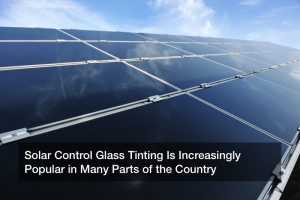
Long gone are the days when heavy curtains and blackout blinds were the only solutions to get relief from the sun. And still, they were not the most effective in blocking out sunlight, and certainly not the most ideal solution for applications where controlled light is required. Even these curtain needs protection from the effects of sun overexposure. In a recent International Window Film Association survey, more than 52% of respondents said they worry about the sun fading their drapes, carpets, and home furnishings.
For this reason, residential and commercial spaces are embracing the use of solar control glass tinting or window films.
What is solar control tint? Solar films are designed to protect the inside of a house from harmful UV light, heat and glares while ensuring maximum comfort, productivity and outside view. This material also helps to improve energy efficiency in your house by significantly reducing solar heat gain. In fact, you could save up to 40% on your utility bill by tinting your windows.
Solar control glass tinting is used to reduce sun exposure for residential and commercial applications. They come in different designs for a variety of applications including safety and security, and decorative window film. In addition to tinted window film, there are other excellent options such as clear and mirrored tinting you can use.
When it comes to installing window tinting, ensuring the film has well adhered and bonded to the glass will help create an effective layer of safety that protects against window shards, as well as preventing break-ins and vandalism. Some decorative options are used to create an illusion of etched glass, particularly in commercial offices. Solar control glass tinting offers more than just sun shading, it helps to transform the looks on commercial spaces drawing attention from prospective customers.
Choosing Between Solar Screens and Tinted Windows
Another popular option for the solar heat shield, in addition to solar control glass tinting, is the use of solar screens. These materials work much like window tinting in eliminating solar heat and light. However, solar screens differ from tinted windows in that they offer shade for the window while glass films bond directly with the window.
Solar screens are cost-efficient than tinting windows and they offer a temporary solution for shielding solar. You can choose from the two main types, which are fixed shade panels or roller shades. However, their high maintenance means they may not be cost-effective after all in the long run. Both options are effective but your choice will mostly depend on the application.
For window films, whether it’s residential or commercial, it’s important to consult with an expert and discuss your priorities to find the right choice for your window needs. An experienced window tinting expert will also ensure the installation is done properly to meet your expectations. If installed well, solar control glass tinting can last over 15 years offering superior solar shield performance.






